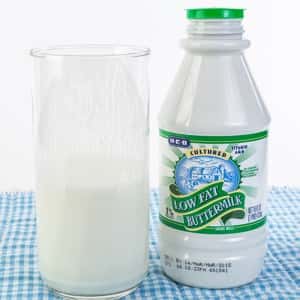
Do you consume dairy products, or do you try to avoid them? Many people find that the lactose in milk makes them uncomfortable. Scientists report, however, that probiotic products can reduce those signs and symptoms (Nutrients, May 20, 2020). Many people who do not produce lactase, the enzyme that digests lactose, enjoy yogurt without problems (Nutricion Hospitalaria, Sep. 7, 2018). How do the benefits of buttermilk compare to those of yogurt?
Are There Benefits of Buttermilk?
Q. Is drinking buttermilk like eating yogurt? How is it different today from old-style buttermilk that resulted from making butter?
A. The old-fashioned buttermilk you refer to was the liquid left after cultured cream was churned into butter. Since the cream itself was cultured, the buttermilk also had milk-friendly cultures.
Modern buttermilk is made by fermenting skim or low-fat milk with lactic acid-producing bacteria such as Lactobacillus bulgaricus or Lactococcus lactis. These lend buttermilk a tart taste.
Yogurt is also a fermented milk product. It too derives its characteristic flavor from lactic acid produced by bacteria fermenting milk sugar. The temperature and length of fermentation time, along with specific bacterial strains, make the difference between buttermilk and yogurt. Research has revealed rich bacterial diversity in traditional fermented milk products (Critical Reviews in Food Science and Nutrition, Dec. 19, 2020). A review of the benefits of buttermilk and yogurt concludes that these probiotic products provide nutrients that strengthen bone (Nutrients, April 17, 2021).
The Benefits of Yogurt for Breakfast:
Q. I have been fighting acid reflux for years with limited success. The antacid tablets and OTC Prilosec don’t help much.
My wife recently convinced me I should join her for breakfast every day. I’m now eating yogurt for breakfast, and that has pretty well solved my problem.
For a test last night I had fried catfish, fried okra, French fries and hush puppies. Despite all that, I didn’t have a hint of trouble during the night.
Since I started having yogurt every day, not once have I come bolting out of bed in the middle of the night. What is really happening here?
Maybe Probiotics Are Responsible:
A. Although we can’t prove it, we suspect the probiotic bacteria in the yogurt are the good guys in this story. Japanese researchers have found that gastrointestinal symptoms improved in people given “fermented milk” (aka yogurt) containing Bifidobacterium bifidum (Bioscience of Microbiota, Food and Health, online Jan. 21, 2015; Journal of Dairy Science, April, 2015). (By the way, we don’t recommend that anyone else tempt fate with hush puppies, fried okra, catfish and French fries!) Both buttermilk and kefir, another fermented milk product, are likely to offer similar protection.
One of the downsides of proton pump inhibitor (PPI) drugs like Prilosec is that they disrupt the microbial ecology of the intestinal tract. While an occasional spoonful of yogurt might not be very helpful, indulging in live-culture yogurt for breakfast every day might help reverse this situation. Some people may prefer the benefits of buttermilk, which is another tangy treat.
We have heard from a few other readers that yogurt can help heartburn. It definitely seems worth a try. If yogurt doesn’t do the trick, you’ll find many other remedies in our Guide to Digestive Disorders.
Citations
- Leis R et al, "Effects of prebiotic and probiotic supplementation on lactase deficiency and lactose intolerance: A systematic review of controlled trials." Nutrients, May 20, 2020. DOI: 10.3390/nu12051487
- Saborido R & Leis R, "[Yogurt and dietary recommendations for lactose intolerance]." Nutricion Hospitalaria, Sep. 7, 2018. DOI: 10.20960/nh.2287
- de Melo Pereira GV et al, "An updated review on bacterial community composition of traditional fermented milk products: what next-generation sequencing has revealed so far?" Critical Reviews in Food Science and Nutrition, Dec. 19, 2020. DOI: 10.1080/10408398.2020.1848787
- Ratajczak AE et al, "Milk and dairy products: Good or bad for human bone? Practical dietary recommendations for the prevention and management of osteoporosis." Nutrients, April 17, 2021. DOI: 10.3390/nu13041329
- Urita Y et al, "Continuous consumption of fermented milk containing Bifidobacterium bifidum YIT 10347 improves gastrointestinal and psychological symptoms in patients with functional gastrointestinal disorders." Bioscience of Microbiota, Food and Health, online Jan. 21, 2015. DOI: 10.12938/bmfh.2014-017
- Gomi A et al, "Health benefits of fermented milk containing Bifidobacterium bifidum YIT 10347 on gastric symptoms in adults." Journal of Dairy Science, April, 2015. DOI: 10.3168/jds.2014-9158

